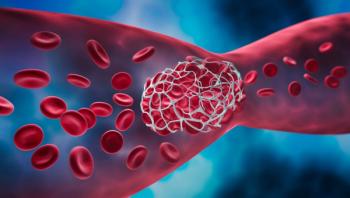
Altuviiio Children’s Study Demonstrates Equivalent Outcomes
A yearlong study of the newly approved half-life extender showed no evidence of factor VIII inhibitors.
A pediatric study of the recombinant Hemophilia A agent Altuviiio (efanesoctocog alfa) has delivered results similar to those that led to February’s FDA approval of this agent in adults and children younger than 12.
In XTEND-Kids, a yearlong phase 3 study, Altuviiio was tested as once weekly prophylaxis against bleeding in children younger than 12.
Altuviiio provided sustained factor VIII (FVIII) levels (≥ 40% of normal) for most of the week and at 15% at the end of the dosing interval.
Importantly, development of factor VIII inhibitors was not detected in the pediatric trial population, which included 74 participants. Previously untreated children with hemophilia A are at higher risk (30% to 35%) of developing inhibitors that neutralize the activity of factor replacement therapy.
Related:
In XTEND-Kids, median and mean annualized bleeding rates were 0.00 and 0.89, respectively.
Study authors said 64% of patients had zero bleeding episodes, 82% had zero joint bleeds, and 88% had no spontaneous bleeds.
“In this study, Altuviiio was well tolerated and demonstrated a safety profile similar to the XTEND-1 trial (patients <12 years of age), confirming safety and efficacy in both adults and children,” drug sponsors Sanofi and Sobi said.
No serious allergic reactions, anaphylaxis, or embolic or thrombotic events were reported.
Altuviiio is among a class of half-life extenders designed to reduce the number of injections required weekly to maintain factor levels in persons with hemophilia A.
The February FDA approval carries indications for routine prophylaxis, on-demand treatment of bleeding disorders, and perioperative management for adults and children with hemophilia A.
Altuviiio, which has a half-life of 40-plus hours, was launched to market in late March 2023 against recently established FVIII half-life extenders
Altuviiio has been estimated to cost $12,000 per week on average and $625,000 per year.
In first quarter 2023 earnings remarks, Bill Sibold, Sanofi Genzyme executive vice president, said the agent already shows promise for capturing a large share of the multi-billion-dollar hemophilia A treatment market.
“We are very encouraged by our early launch indicators, including initial patient switches from both factor and Hemlibra to Altuviiio as well as an enthusiastic response by the physician and patient community,” he said.
In the pivotal study for Altuviiio, prophylaxis treatment also improved physical health of patients and reduced pain.
Altuviiio “marks an important clinical advancement for the hemophilia community because we have an option that can achieve higher levels of factor activity with a single simplified weekly dose,” said
Newsletter
Get the latest industry news, event updates, and more from Managed healthcare Executive.























